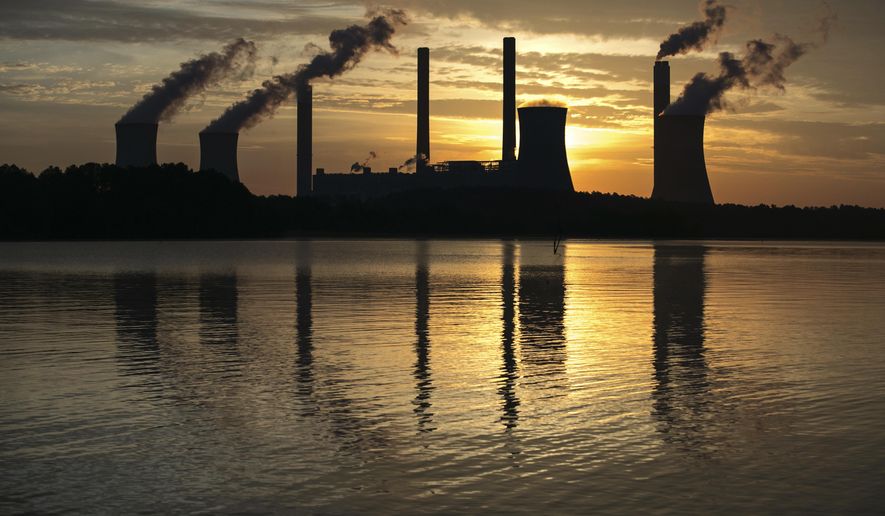The biggest critics of President Trump’s decision to withdraw from the Paris climate accord are also the world’s biggest hypocrites on energy policy, top environmental groups charged Wednesday in a report that found many top nations’ rhetoric on cutting emissions doesn’t line up with how and where they spend their money.
The study examined Group of 20 member countries and was released a day before Mr. Trump arrived in Germany for meetings with other members of the key international group, with energy and climate change expected to be at the top of the agenda.
The key finding: The G-20 nations spend roughly four times as much in public financing for fossil fuels as they do supporting renewable energy sources such as wind and solar. The report examines loans, grants, guarantees, insurance and other types of public finance offered either by the governments, government-owned financial institutions and credit agencies, and multilateral groups made up of G-20 countries.
From 2013 to 2015, the G-20 nations spent $71.8 billion annually supporting fossil fuels, the study said, compared with $18.7 billion each year on direct support for clean energy such as solar, wind, geothermal or hydro power. Most of the fossil fuels money went to oil and gas exploration, but some also went to coal, which critics say is the dirtiest-burning fuel and the greatest driver of the greenhouse gas pollution that the Paris treaty was supposed to address.
“Our research shows that the G-20 still hasn’t put its money where its mouth is when it comes to the clean energy transition. If other G-20 governments are serious about standing up to Trump’s climate denial and meeting their commitments under the Paris agreement, they need to stop propping up the outdated fossil fuel industry with public money,” said Alex Doukas, a senior campaigner at Oil Change International, one of the groups that authored the study.
The Sierra Club, Friends of the Earth and the World Wildlife Fund’s European office also were a part of the project.
SEE ALSO: Donald Trump on G-20 world stage with Vladimir Putin, Angela Merkel
On its surface, the report would seem to give credence to the argument that the Paris accord doesn’t ask much from other nations. Mr. Trump made that argument — along with putting America’s economy first — the centerpiece of his rationale for leaving the deal last month.
Indeed, environmentalists now say the same nations that have criticized Mr. Trump’s decision aren’t doing their part either.
In fact, the most outspoken opponents of Mr. Trump’s decision to pull the U.S. from the Paris deal — which included a pledge by President Obama to cut U.S. greenhouse gas emissions by at least 26 percent by 2025 — are some of the worst offenders.
Within hours of Mr. Trump’s announcement on June 1, the leaders of Germany, Italy and France issued a joint statement castigating the U.S. and saying the Paris pact is non-negotiable. They said the Trump administration should not try to revamp the deal in order to secure more favorable terms.
“We firmly believe that the Paris agreement cannot be renegotiated,” the three heads of state said in a joint statement, expressing “regret” with the course Mr. Trump chose.
Words and deeds
But two of those countries are hardly backing up their harsh words with action.
Germany supplied $3.5 billion annually in public finance for fossil fuels from 2013 to 2015, compared with $2.4 billion annually for clean energy, according to the study. Italy funneled $2.1 billion toward fossil fuels, compared with $123 million annually for clean energy.
Canada, another vocal critic, directed $3 billion annually in public finance for oil, gas and coal from 2013 to 2015 while putting $171 million annually toward clean energy.
China, the world’s top polluter, provided $13.5 billion annually for fossil fuel financing compared with less than $85 million annually for clean energy.
France directed more money toward renewable energy than fossil fuels, making it a notable exception to the broader trend.
France aside, green groups say the hypocrisy is striking.
“These countries have been talking out of both sides of their mouths,” said Nicole Ghio, a senior international campaign representative at the Sierra Club. “It’s unconscionable that any nation would continue to waste public funds on fossil fuels when clean energy sources like wind and solar are not only readily available, but are more cost-effective and healthier for families and communities across the globe. It is past time for G-20 nations to stop subsidizing fossil fuels once and for all.”
The Paris deal came into effect at the end of 2015, the final year examined as part of the deal. Since then, world leaders have, at least with words, recommitted their countries to developing and subsidizing clean energy.
The U.S. is in line with most of the world in terms of where it puts its money. It provided $6 billion annually for fossil fuels and $1.3 billion for renewable energy, according to the study.
On its surface, it appears the U.S. would have had to make the most drastic shift in energy financing in order to meet its Paris target. The American commitment of a 26 percent reduction by 2025 would have required massive increases in government financing of clean energy. China, on the other hand, committed only to start cutting its emissions by 2030, meaning it could in theory continue to prop up fossil fuels for the next 13 years.
Mr. Trump said that dynamic is unacceptable but that he is open to rejoining the accord so long as the terms don’t punish the U.S. economy.
“We’re getting out, but we will start to negotiate, and we will see if we can make a deal that’s fair,” he said in a Rose Garden address last month. “And if we can, that’s great. And if we can’t, that’s fine.”
• Ben Wolfgang can be reached at bwolfgang@washingtontimes.com.




Please read our comment policy before commenting.